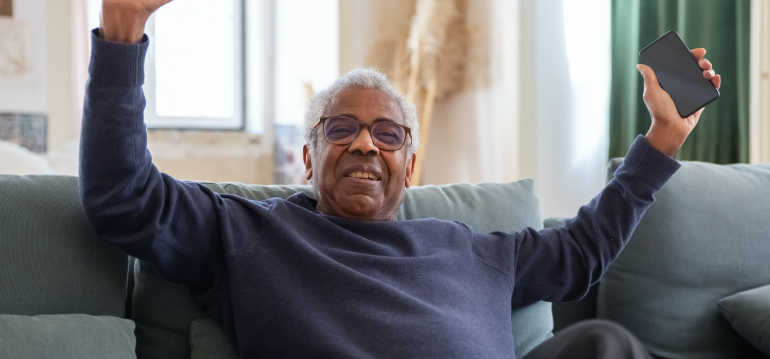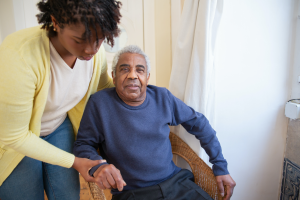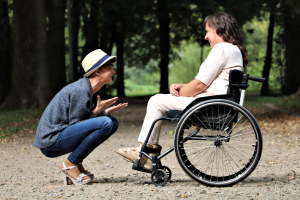
At the end of 2021, the Census Bureau reported that more than 55 million Americans are age 65 or older. Florida also happens to be one of the most populated by these senior citizens, sharing one-fourth of these older Americans with California and Texas. Most of these people want to age in place, but providing private care in the home takes planning.
Seniors often underestimate the amount of coordination needed to safely age in place at home. Even the strongest family relationships can be stretched and for those without involved adult children, the choice of staying at home seems improbable. If you want to support your aging parent in their goal of aging in place, consider the following five suggestions for keeping a senior safe at home.
5 Steps to Safety at Home
1. Safety first in their living spaces.
2. Manage caregiver burnout by asking for help.
3. Prioritize scheduling time for yourself.
4. Get familiar with your parents legal documents and insurance.
5. Set timelines to review your plan.
1. Keep their space safe.
Your parents may have lived in their home for a long time. It may even be the home you grew up in. Warm and homey or cluttered and confusing, it’s your parent’s favorite place and it may need a few changes to continue to work for them. Take a look around with safety in mind. What needs to change to keep them safe?
Safe Changes to Make
Furniture placement
Lighting
Trip hazards
We all love a little décor to brighten up our homes, but there can be a time when those lovely little additions become dangerous. Throw rugs add color to the room and an extra trip hazard to avoid. Bathmats are meant to soak up water after a shower but can easily get caught in the legs of a walker or lift to catch the toe of a shoe. If you want advice from a professional, get a consultation from a private home health care company near you and let them look at the home with fresh eyes.
2. There’s no shame in it – caregiver burnout is real.
It’s okay to say that too much is too much. With 80% of women serving as Chief Healthcare Officers of their own home (and often their parents. AND their in-laws), the risk of burnout is a very real concern. Women are also raising children and grandchildren while simultaneously taking care of aging parents and working outside of the home. It’s no wonder women are tired!
It is important to look at the tasks that need to be done and be real with yourself. Some just may not be for you – and that’s okay. Examine your comfort level with personal care and determine what you can reasonably do. Can you physically and emotionally assist your parent with personal activities such as bathing, grooming, and toileting?
It is completely acceptable to ask for outside help and private duty health care may be a perfect resource for you. Family caregivers often feel guilty about hiring outside help, but that burden will only serve to make the job harder. The truth is that it is courageous to ask for help – and hiring private duty caregivers often gives you more time to spend being a family member and not a caregiver.
In-Home Private Duty Care – Who Pays for That?
Prepare to help your loved ones age safely at home by being aware of the costs of private home health care. The majority of older adults want to age in place. Create a plan that includes private care in the home and be aware of ways to pay. In general, private pay is the most common, however, there are VA Aid & Attendance benefits that cover some of the costs as well as public benefits in Florida.
3. Use private duty care to help schedule your personal time.
Many caregivers don’t take time for themselves. This includes postponing their own doctors’ appointments and deprioritizing their own wellness. If you are supporting older adults who choose to age in place at home, be sure to schedule some good ol’ fashioned “Me Time.” Try scheduling activities you enjoy and then stick to it!
Me Time Activities
Yoga
Mediation
Tai chi
Lunch with friends
Get familiar with other services that help you meet your goal of more time for yourself. A private duty home care agency can work with you to provide private duty caregivers to be sure you get some precious time away. Don’t be afraid to ask for a little extra help and to find support among your friends, family, or a local caregiving group.
Learn local resources like senior adult daycare and services that provide private care in the home so that you can prioritize your physical health. Taking care of a loved one is one of the most stressful jobs you can do. Taking time for yourself can make all the difference.
4. Get familiar with benefits and legal documents.
Whether your aging parents will be living with you, or you are supporting them in their own home, take time to get familiar with legal documents. If you will be helping to make doctors’ appointments, get medical test results, and place phone calls to gather medical or other personal information, be sure you have legal authority in writing. A solid aging plan includes advance directives, such as a Durable Power of Attorney.
There is no time like the present to get familiar with the difference between Medicare and Medicaid. There are plenty of myths about Medicare and the expectation that these programs will pay for care if an older person runs out of money. Enrollment in Medicaid is dependent on finances whereas Medicare is an entitlement for people 65 or older that provides fee-for-service health insurance.
Additionally, preparing to take care of parents as they age in place includes a review of their current medical insurance. Some seniors trade in their traditional red, white, and blue Medicare card benefits for an “advantage plan.” Be aware of the benefits of their health plan and if it’s working for them. If not, Medicare Open Enrollment comes around one time every year.
5. Be realistic about timelines.
As Robert Burns said in 1785, the best laid plans of mice and men often go awry. As you enter discussions about your parents aging at home, establish timelines to review the plan. It is healthy to continue conversations about a move to senior living and what that might look like if needed. Difficult conversations only get harder the longer we put them off – open communication will be key.
While safety is a number one priority for those who want to age at home, often the conversation about safety is limited to just falls. Safety includes not only fall prevention, but also burns, medication poisoning, fires, and protection from abuse, theft, and scams. A private duty caregiver does more than just provide personal care. They are an added layer of protection for safety, often extending the timeline for the senior to age in place at home safely.
Aging in place at home is not impossible, and success is more likely when families are open to outside help. Local resources like a private duty home care near you are an invaluable source of care and support. Knowledge is power and knowing all is available to help you support your aging parents is a solid caregiving position.
Their supportive nature and dependability are two reasons why Private Duty Home Care is a Resource We Love. Read more about customizable care and well-trained caregivers in the Resources Section of our Blog.










